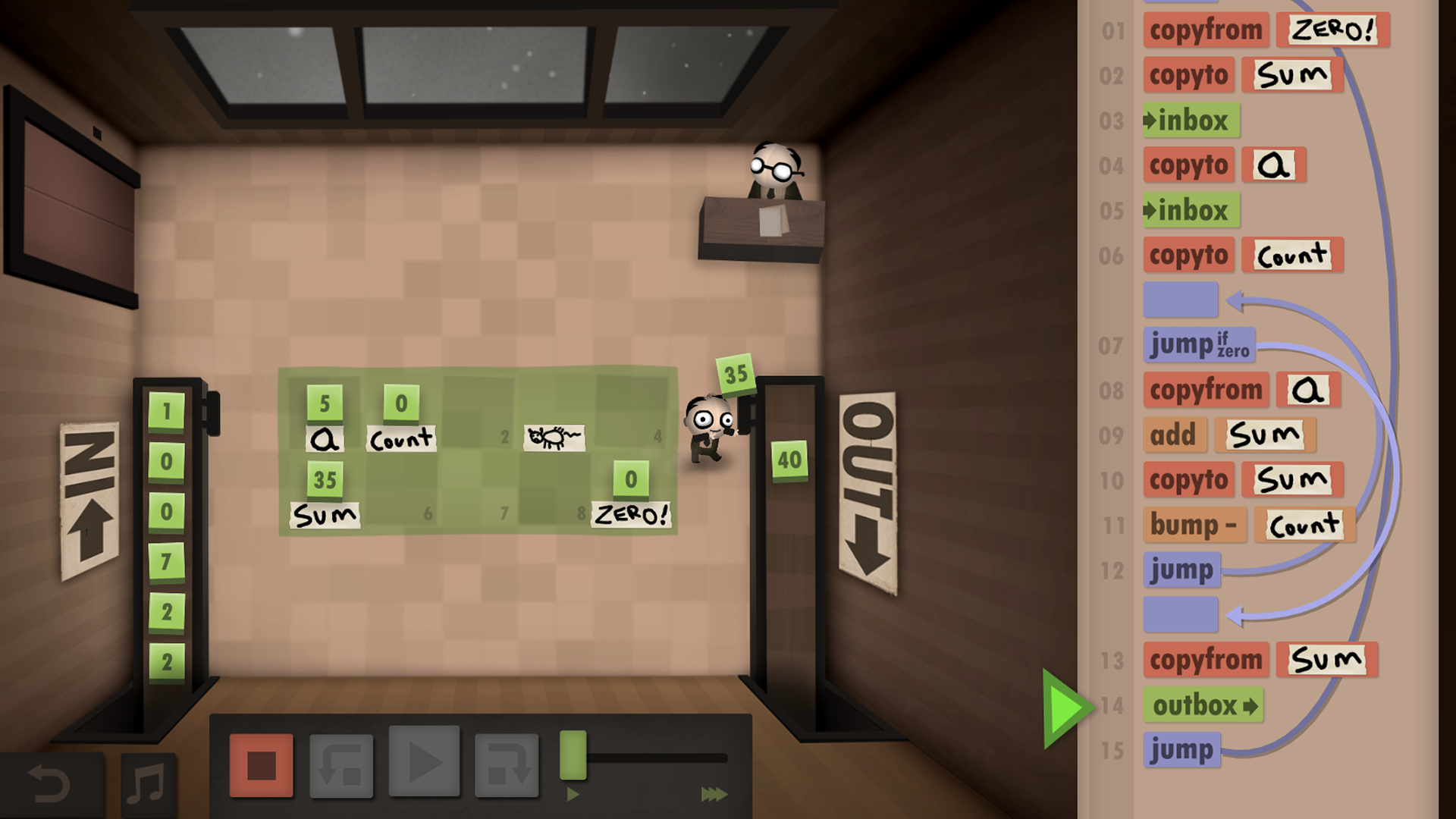hrm-cpu
v0.2.3
Published
Run Human Resource Machine programs in JavaScript
Downloads
10
Maintainers
Readme
hrm-cpu
Run Human Resource Machine programs in JavaScript
This is a JavaScript runtime for the programs you write in the game Human Resource Machine

Human Resource Machine is a puzzle game. In each level, your boss gives you a job. Automate it by programming your little office worker! If you succeed, you'll be promoted up to the next level for another year of work in the vast office building. Congratulations!
NPM
npm install hrm-cpu
Usage
Requires node 4.x - uses ES6
Basic Usage
const HrmCpu = require( 'hrm-cpu' )
//source is a string in the Human Resource Machine program format
const source = loadSomeSourceFile()
//the initial state of the inbox - treated as FIFO
const inbox = [ 5, 18 ]
//initial memory state - set just slot 9 to 0
const tiles = {
9: 0
}
const outbox = HrmCpu( source, inbox, tiles ).run()
console.log( outbox )
Some levels don't require any floor tiles, in which case you can do:
const outbox = HrmCpu( source, inbox ).run()Some levels don't require an inbox, but if this is the case they must have floor tiles:
const outbox = HrmCpu( source, [], tiles ).run()Advanced Usage
Also see examples directory or try running the tests with mocha
Factory overloads
HrmCpu( state )
HrmCpu( options )
HrmCpu( source, inbox )
HrmCpu( source, options )
HrmCpu( source, inbox, tiles )
HrmCpu( source, inbox, floor )HrmCpu is a factory function that returns an object with some properties and
the functions run and step
{
options: {...},
state: {...},
run: ( cb ) => ...,
step: ( cb ) => ...
}Regardless of which overloads you choose, the factory requires a source file, and either of, or both of, inbox and floor state
If run is called synchronously it runs the whole program and returns the outbox
If step is called synchronously it executes a single line of the program, and
returns the program state
If run is called asynchronously it runs the whole program and then calls the
callback with ( err, outbox, state )
If step is called asynchronously it executes a single line and calls with
( err, state )
State
The state object when set to the initial defaults looks like:
{
program: [],
accumulator: null,
inbox: [],
outbox: [],
memory: [],
counter: 0,
steps: 0,
running: false
}Options
Passed in options extend the default options, which are:
{
source: '',
inbox: [],
tiles: [],
columns: Infinity,
rows: Infinity,
commands: [ 'INBOX', 'OUTBOX', 'COPYFROM', 'COPYTO', 'ADD', 'SUB', 'BUMPUP', 'BUMPDN', 'JUMP', 'JUMPZ', 'JUMPN' ],
dereferencing: true,
maxSteps: 5000,
maxSize: 255,
minValue: -999,
maxValue: 999
}These match the constraints of the actual game
source, inbox and tiles are described above
columns and rows describe the floor layout - these determine the valid floor
addresses and if set and your program tries to access a tile outside of these,
an error will be thrown or sent to your callback, depending on whether you used
the sync or async call
commands are the commands allowed for the current program - for example, in
the early levels many commands are not yet available
dereferencing is whether or not the program can access memory indirectly eg [12]
maxSteps is the maximum number of steps your program can run
maxSize is the maximum length of a program, not counting labels and comments.
A jump only counts as one line
minValue is the minimum value that you can hold in your hand
maxValue is the maximum value that you can hold in your hand
Async example
HrmCpu( source, inbox, tiles ).run( ( err, outbox ) => {
if( err ){
console.error( err )
} else {
console.log( outbox )
}
})Get program state from run
HrmCpu( source, inbox, tiles ).run( ( err, outbox, state ) => {
if( err ){
console.error( err )
} else {
console.log( state )
}
})Related projects
Runtimes
Parsers
Comment/label decoders & encoders
Viewers
Solutions
Utils/data
Please let me know if you know of any others!
License
MIT
